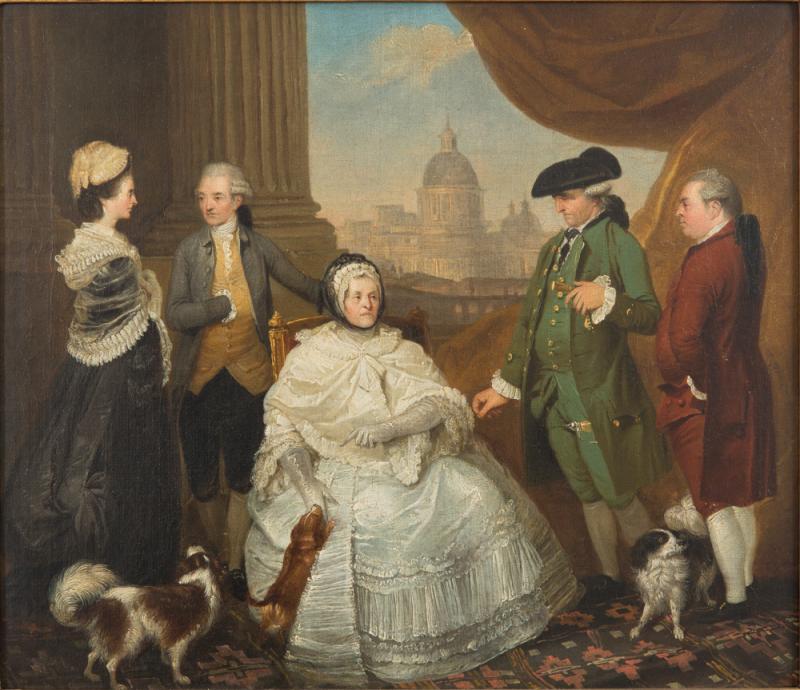Quote
"Our mornings are generally spent in visiting the antiquities, and the paintings in the palaces. On those occasions we are accompanied by Mr. Byres, a gentleman of probity, knowledge, and real taste. We generally pass two or three hours every evening at the conversazionis..."
Links to the Encyclopedia:
Keywords
Our mornings are generally spent in visiting the antiquities, and the paintings in the palaces. On those occasions we are accompanied by Mr. Byres, a gentleman of probity, knowledge, and real taste. We generally pass two or three hours every evening at the conversazionis; I speak in the plural number, for we are sometimes at several in the same evening. It frequently happens, that three or four, or more, of the nobility, have these assemblies at the same time; and almost all the company of a certain rank in Rome make it a point, if they go to any, to go to all; so that, although there is a great deal of bustle, and a continual change of place, there is scarcely any change of company, or any variation in the amusement, except what the change of place occasions: but this circumstance alone is often found an useful accomplice in the murder of a tedious[382] evening; for when the company find no great amusement in one place, they fly to another, in hopes they may be better entertained. These hopes are generally disappointed; but that does not prevent them from trying a third, and a fourth; and although to whatever length the experiment is pushed, it always terminates in new disappointments, yet, at last, the evening is dispatched; and, without this locomotive resource, I have seen people in danger of dispatching themselves. This bustle, and running about after objects which give no permanent satisfaction, and without fully knowing whence we came, or whither we are going, you’ll say, is a mighty silly business. It is so;—and, after all the swelling importance that some people assume, Pray what is human life?
Having told you what five or six conversazionis are, I shall endeavour to give you some idea what one is. These assemblies are always in the principal apartment[383] of the palace, which is generally on the second, but sometimes on the third floor. It is not always perfectly easy to find this apartment, because it sometimes happens that the staircase is very ill lighted. On entering the hall, where the footmen of the company are assembled, your name is pronounced aloud, by some servants of the family, and repeated by others, as you walk through several rooms. Those whose names are not known, are announced by the general denomination of i Cavalieri Forestieri, or Inglesi, as you pass through the different rooms, till you come to that in which the company are assembled, where you are received by the master or mistress of the house, who sits exactly within the door for that purpose. Having made a short compliment there, you mix with the company, which is sometimes so large, that none but the ladies can have the conveniency of sitting. Notwithstanding the great size and number of the rooms in the Italian palaces, it frequently happens[384] that the company are so pressed together, that you can with difficulty move from one room to another. There always is a greater number of men than women; no lady comes without a gentleman to hand her. This gentleman, who acts the part of Cavaliero Servente, may be her relation in any degree, or her lover, or both. It is allowed him to be connected with her in any way but one—he must not be her husband. Familiarities between man and wife are still connived at in this country however, provided they are carried on in private; but for a man to be seen hand in hand with his wife, in public, would not be tolerated.
At Cardinal Berni’s assembly, which is usually more crowded than any in Rome, the company are served with coffee, lemonade, and iced confections of various kinds; but this custom is not universal. In short, at a conversatione, you have an opportunity of seeing a number of well-dressed people, you speak[385] a few words to those you are acquainted with, you bow to the rest, and enjoy the happiness of being squeezed and pressed among the best company in Rome. I do not know what more can be said of these assemblies; only it may be necessary, to prevent mistakes, to add, that a conversazione is a place where there is no conversation. They break up about nine o’clock, all but a small select company, who are invited to supper. But the present race of Romans are by no means so fond of convivial entertainments, as their predecessors. The magnificence of the Roman nobility displays itself now in other articles than the luxuries of the table: they generally dine at home, in a very private manner. Strangers are seldom invited to dinner, except by the foreign ambassadors. The hospitality of Cardinal Bernis alone makes up for every deficiency of that nature. There is no ambassador from the Court of Great Britain at Rome, but the English feel no want of one. If the[386] French Cardinal had been instructed by his court to be peculiarly attentive to them, he could not be more so than he is. Nothing can exceed the elegant magnificence of his table, nor the splendid hospitality in which he lives. Years have not impaired the wit and vivacity for which he was distinguished in his youth; and no man could support the pretensions of the French nation to superior politeness, better than their ambassador at Rome.
Sources
John Moore, A View of Society and Manners in Italy. London: Printed for W. Strahan; and T. Cadell, in the Strand, 1781, Volume 1 (of 2), p. 381-386. Full text at the Project Gutenberg.
